Association between Sleep and Skin
By Amore Pacific and Chung-Ang Univ. Hospital
[Editor's note] When you lack of sleep due to too much work, or you can't sleep well from insomnia, or you just don't have enough time for sleep, you can't help yourself hoping that it wasn't me looking into the mirror. Sometimes might look 10 years older with dark circles getting worse under your eyes and rough skin like a sand paper. Here you come to think, is it true, that getting less sleep will actually make your skin be different?
A research team of AmorePacific and Chung-Ang University Hospital's dermatology team jointly studied and announced the link between sleeptime and skin. The results of the experiment did not seem so different from what people expect in general. From the first day when sleep was limited to four hours, the skin moisture level decreased significantly. We noticed that the exfoliation rate increased and the increased state remained. Limitations of sleeping period also affected skin wrinkles. Less sleep increased the eye and forehead wrinkles belongs to the facial wrinkles. The skin brightness under the eyes, called dark circles, has inevitably darkened. In other words, even with a little numbers of restriction, the skin condition is highly affected. And when longer the limited time, the slower the skin becomes recovered. Then how should we act careful about our sleeping habits for our healthy-looking skin?
Jang Soo-im, a senior researcher who majored in medical science and has been working for AmorePacific for the past seven years, said she had a lot of interest in how numerous conditions in everyday life, such as how sleeping affect our skin and how it is being influenced. Jang, a senior researcher who has been studying skin changes in various environmental conditions, actually studied and published results on not only sleeping but also skin damages when being outside the ski resort for a long time under different seasonal conditions. Here are some questions answered by Jang about her study as below.
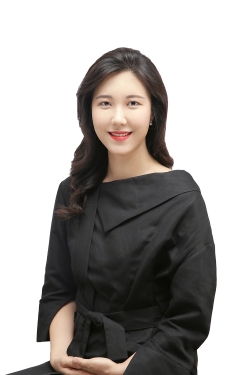
Q. Can you tell us more about how your study begun which reveals the relationship between sleeping and skin condition. How long did the research take?
A. If you don't get enough sleep, you feels dry skin and your skin might look fatigued, but it hasn't been scientifically proven yet. In order to prove and to reveal the people's perception of sleep and skin condition that is generally believed, I came up with an idea together with Professor Kim Beom-joon from Chung-Ang University. We jointly conducted the study and published the paper on this subject which took about a year from an idea to the thesis presentation.
Q. Why did you select ‘Female in 40s' as subjects?
A. According to a report on sleep disorders by Korea Occupational Safety and Health Agency, people in their 40s agreed the most questions about "difficult to fall asleep." Based on these results, we set the target age group for people in their 40s, and the reason we set the target for women was to minimize the factors that could affect the study by the difference in basic skin characteristics from gender differences.
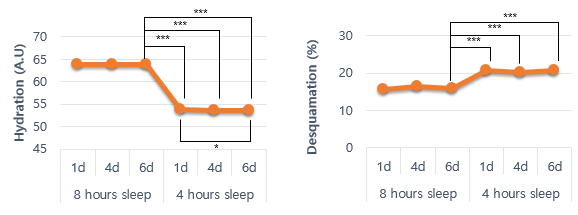
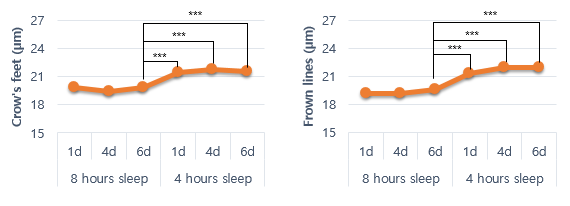
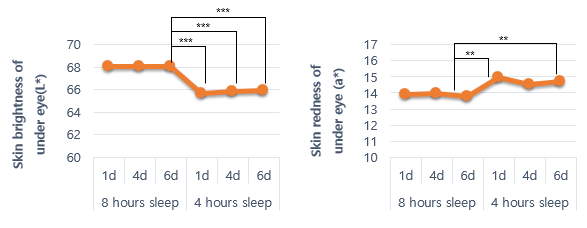
Q. Do you have any additional research plans for other target groups?
We’re planning to expand the study by various ages and sexes. In particular, as Korean being the one of OECD countries with lowest sleeping hours for teenagers, we plan to expand our study to middle and high school students who lack sleep in general.
Q. From the first day, the comparison between 8 hrs and 4 hrs sleep influence seemed very interesting. Does it mean that even if you don't sleep enough just for a day, would affect your skin condition that much?
A. That’s right. as the result shows, we’ve found that even if you sleep less just for a day, there will be changes in the amount of moisture, exfoliation, glossiness, transparency and elasticity of your skin. Especially regarding skin moisture level, the longer you sleep less, the worse the effect on your skin, and it eventually takes a long time for your skin to recover. Therefore, from the first day you sleep less, I’d like to recommend you should pay a special attention to your skin moisturization.
Even if you sleep less just for a day, there will be changes in the amount of moisture, exfoliation, glossiness, transparency and elasticity of your skin.
If you tend to have less sleep in general, intensive skin moisture should come first for your skincare.
Q. Then if you have a lot of work or if you don't get enough sleep, your skin will continue to be damaged. Is it possible to take care of skin care products that we use in our daily routine?
A. Among the products developed by Amore Pacific, we have confirmed that IOPE STEM III AMPOULE, which contains ALLANTO-LIPOSOME™ which helps with skin vitality. When using Stem III during sleep time limited to 5 hours, we found that skin indicators improved to a level similar to those of 8 hours of sleep. In other words, if you sleep less, you can say that skin care products can minimize skin damage if they moisturize and regenerate your skin.
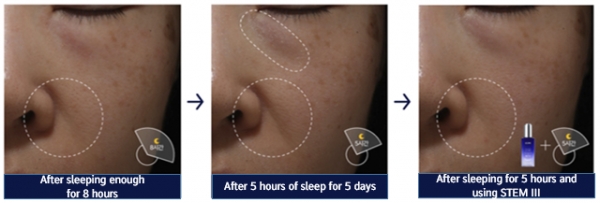
Q. This study has proven that sleep is not just a time for a break, but a time to recover from skin damage. Can sleep quality also affect skin condition?
A. First of all, we conducted a sleep-quantity study, not the quality of sleep observed at the same time period. In addition, we are now planning to study how the skin changes when the quality of sleep changes. We are considering various study designs such as for morning people, early birds, and night owls with the same amount of sleep.
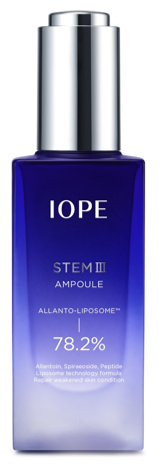
Stem III ampoule is a fundamental skincare solution for women with stress sensitive, slow recovery skin and with weak skin barrier in their 30s and 40s. It is explained by the "three more hours of sleep every day." The key is ALLANTO-LIPOSOME™'. The key factor here is to focusing on the ingredients applied in the event of skin damage caused by external irritation and dryness.
It was developed and show-cased a product containing 78.2 percent of the product in a liposome-like form that is 400 times finer than hair. Sensitive skin can also be applied after pre-testing such as skin irritation test, allergic test, and alternative test for eye stimulation. So called 'unclean' eight ingredients such as animal derived ingredients, mineral origin substances, polyacrylamide, imidazolidinyl urea, triethanolamine, synthetic pigments, added fragrance and etc are not included for this product's mild formula.

